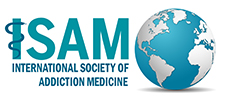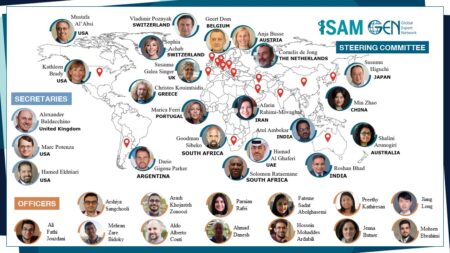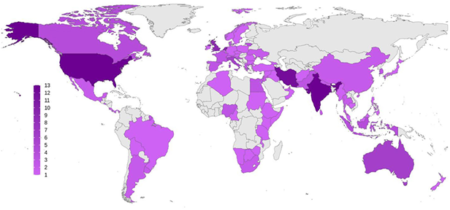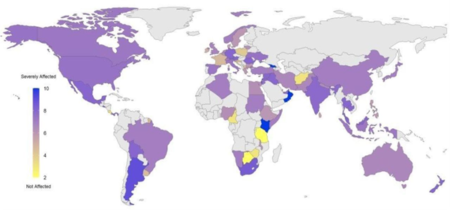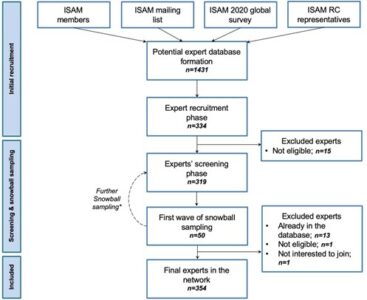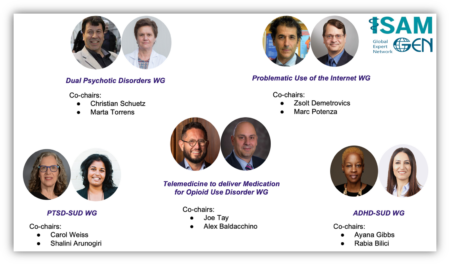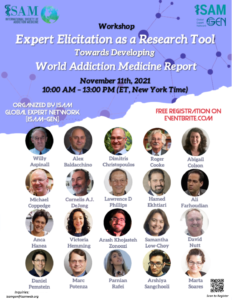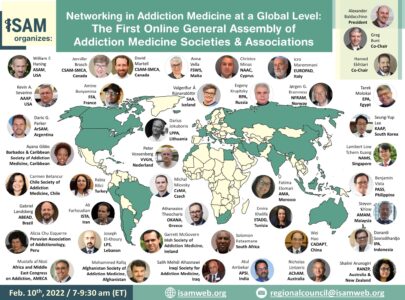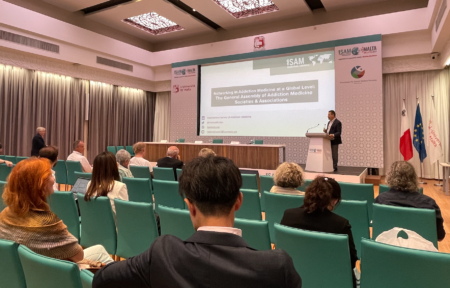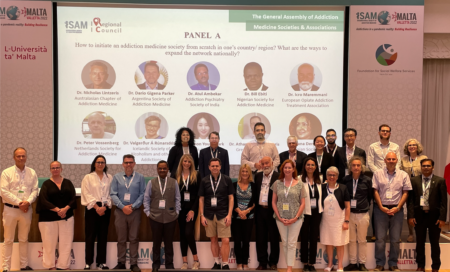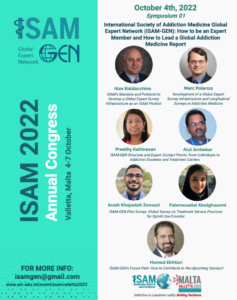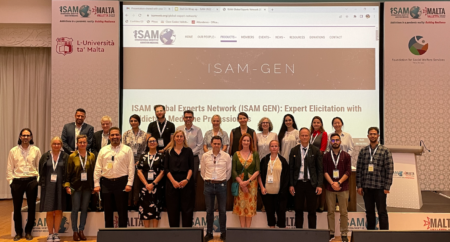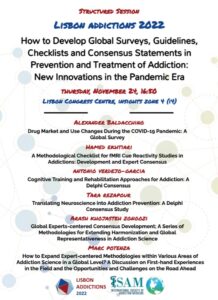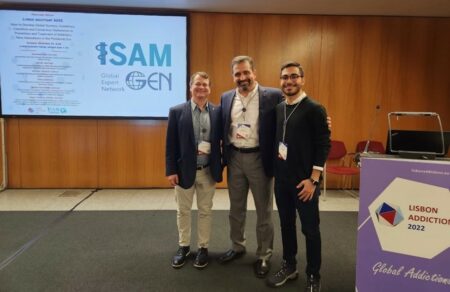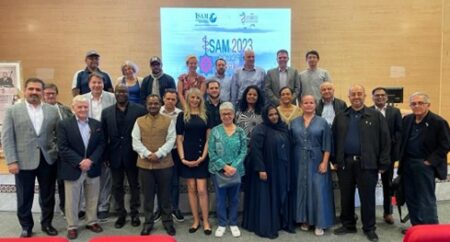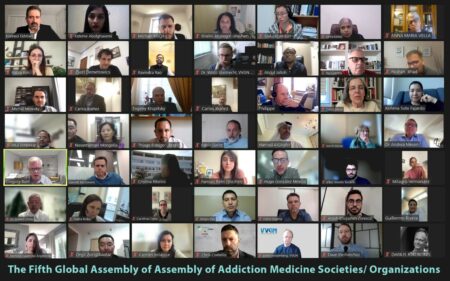ISAM Global Experts Network (ISAM GEN): Expert Elicitation with Addiction Medicine Professionals
ISAM Global Expert Network (ISAM-GEN) is the latest product of the ISAM which has aimed to extend the borders of addiction medicine through connecting experts around the world within an international network for expert elicitation. The foundations of ISAM-GEN go back to the earliest days of the COVID-19 pandemic in 2020 where its initial international survey was conducted as a rapid response to collect reliable information from experts on how the field is responding to the situation. Afterwards, ISAM-GEM aimed to build on this endeavor and develop a global expert infrastructure based around ISAM which can enable valid and reliable expert elicitation and consensus-building in the various sub-disciplines of addiction sciences.
Leadership:
Secreteriats: Hamed Ekhtiari (University of Minnesota, USA), Marc Potenza (Yale University, USA), Alex Baldacchino (St Andrews University, UK)
Steering Committee: Shalini Arunogiri (Monash University, Australia), Marica Ferri (EMCDDA, EU), Atul Ambekar (All India Institute of Medical Sciences, India), Sophia Achab (University of Geneva, Switzerland), Dario Gigena Parker (Ministerio de Salud de Córdoba, Argentina), Hamad Al Ghaferi (National Rehabilitation Center Abu Dhabi, UAE), Vladimir Poznyak (Switzerland), Susumu Higuchi (Kurihama Medical and Addiction Center, Japan), Christos Kouimtsidis (National Office for Addressing Drugs, Greece), Anja Bussee (UNODC), Cor de Jong (Radboud University, Netherlands), Afarin Rahimi-Movaghar (Iranian National Center for Addiction Studies, Iran), Geert Dom (University of Antwerp, Belgium), Susanna Galea Singer (St Andrews University, UK), Mustafa Al’Absi (University of Minnesota, USA), Min Zhao (Shanghai Jiaotong University School of Medicine, China), Kathleen Brady (Medical University of South Carolina, USA), Afarin Rahimi-Movaghar (Iranian National Center for Addiction Studies, Iran), Solomon Tshimong Rataemanea (University of Limpopo, South Africa), Goodman Sibeko (University of Cape Town, South Africa), and Roshan Bhad (All India Institute of Medical Sciences, India) (NEW)
Assistant Officers: Arshiya Sangchooli (protocol officer), Arash Khojasteh Zonoozi (protocol officer), Parnian Rafei (communication officer), Fateme sadat Abolghasemi (communication officer), Aldo Alberto Conti (data analytics officer), Ali Fathi Jouzdani (data analytics officer), Mehran Zare-Bidoky (data analytics officer), Ahmad Danesh (data analytics officer), Hossein Mohaddes Ardabili (publication officer), Preethy Kathiresan (publication officer), Jenna Butner (compliance officer), Jiang Long (compliance officer), Mohsen Ebrahimi (data mining officer)
Technical Support: Marilyn Dorozio (ISAM Office, Canada)
Background and mission statement
Expert opinion constitutes an important source of information, especially when other types of data are scarce, the issues under discussion are complex and difficult to address with available data, or there is a need for rapid synthesis of information and intervention formulation. The dynamic and complex nature of substance use disorders and behavioral addictions necessitates the formation of global networks which can rapidly identify emerging challenges, synthesize cross-national information, and provide valid consensus opinions on areas of disagreement. In the wake of the COVID19 pandemic, to assess shifts in the patterns of addiction and national service provision to affected individuals, an ISAM working group conducted a survey of 185 experts in addiction sciences from 77 countries in 2020. The outcome of that survey was encouraging, prompting the ISAM to establish a sustained global network of experts.
The ISAM Global Expert Network (ISAM-GEN) aims to continue this endeavor and develop a global expert infrastructure based around ISAM which can enable valid and reliable expert elicitation and consensus-building in the various sub-disciplines of addiction sciences.
ISAM-GEN protocol paper
You can read more about ISAM-GEN’s structures and procedures on the protocol paper which is now published and available online on Frontiers in Psychiatry: https://www.frontiersin.org/journals/psychiatry/articles/10.3389/fpsyt.2024.1230318/abstract
Past and current projects
In response to unprecedented challenges posed by the COVID-19 pandemic, the International Society of Addiction Medicine (ISAM) in March 2020 delineated practical guidelines for addiction researchers and policymakers to support decision making during the pandemic (bcn.iums.ac.ir/article-1-1743-en.html). Almost one month after this announcement, in April 2020, ISAM conducted a rapid, multi-phasic expert survey of informants from across the globe to investigate the impacts of the COVID-19 on different aspects of addiction medicine during the pandemic; including changes in the patterns of drug and alcohol use, price alterations, virtual care, education and training qualities, and addiction treatment and harm reduction services for high-risk populations with substance use disorders. The study protocol was published in June 2020 (bcn.iums.ac.ir/article-1-1821-en.html). A total of 185 respondents from 77 countries participated in the first phase of this global survey:
Given the lack of multicentric addiction epidemiology studies in the early months of the COVID-19 pandemic, the ISAM global survey investigated the status of substance use during a 5-week period starting in April 4th, 2020. Respondents from 77 countries reported a significant decrease in drug supply (69.0%), and an increase in prices of the alcohol and drugs market (95.3%) in their countries. The findings also suggested an increase in the usage of alcohol (71.7%), cannabis (63.0%), prescription opioids (70.9%), and sedative/hypnotics (84.6%), while the use of amphetamines (59.7%), cocaine (67.5%), and opiates (58.2%) was reported to be decreasing. A majority of experts also reported increases in complications related to drug and alcohol use (https://www.frontiersin.org/articles/10.3389/fpsyt.2021.646206/full). An overall rating of the general impact of the pandemic on people with substance use disorders is presented below:
Lastly, the results of this global expert survey suggested an alarming impact on substance use treatment and harm reduction services during the first few months of the COVID-19 pandemic, with more than 40% of represented countries having experienced partial discontinuations of important harm-reduction services. Based on this survey, the directors of the ISAM global survey highlighted several issues which needed to be tackled more effectively (www.frontiersin.org/articles/10.3389/fpsyt.2021.639393/full).
The ISAM-GEN is currently working to further develop and validate the global expert survey infrastructure required for future global surveys. One of the currently running projects is the pilot survey as brought up in the protocol paper which is being held in two distinct phases on treatment service provision for opioid use disorder. (NEW)
ISAM-GEN recruitment process and experts’ database
Up to January 2023, ISAM-GEN database of experts has been developed with a round of snowball sampling, comprising a total number of 354 experts from multiple sub-disciplines of addiction representing 78 countries across the world, which is also presented in the protocol paper (Link to the protocol paper). Further rounds of recruiting experts are being planned to be organized through ISAM regional council members and national ambassadors in order to expand the number of experts in the database.
ISAM-GEN pilot survey on “Treatment service provision for opioid use disorders” updates; results and discussion
The ISAM-GEN pilot survey, conducted among 43 addiction medicine societies/organizations representing 40 countries worldwide, has now released its results. These findings have been privately shared with all participating societies to gather their feedback. Additionally, each participating society has been recently reached out, requesting a brief summary that outlines the current landscape of opioid use, treatment modalities, and harm reduction strategies in their respective countries. After a robust thematic analysis process, these summaries will be incorporated into the discussion section of the article.
Formation of ISAM-GEN working groups
ISAM-GEN currently has five working groups, aiming at developing global surveys to explore a range of comorbid psychiatric disorders, emerging addictive behaviors, and novel therapeutic approaches for patients with substance use disorders. These working groups consist of:
- SUD-psychosis (Dual Disorders) working group: With the aim of assessing practice to diagnose and treat psychotic disorders associated with substance use disorder, the working group of addiction and concurred psychotic disorders (dual disorders) was formed in early 2023. Among the working groups established within ISAM-GEN, the dual disorders working group, led by Christian Schuetz (Canada) and Marta Torrens (Spain), has made significant progress. A number of meetings have taken place between the ISAM-GEN team and this working group, with the aim of laying the groundwork for survey development and infrastructure improvements. The questionnaire is now prepared in 21 questions and 2 case scenarios after several revisions and will be shared within the network of experts of the ISAM-GEN in the upcoming months. The steering committee of this working group is consisted of key experts from various countries including Linda Montanari (EMCDDA), Edyta Truszkowska (Ireland), Geert Dom (Belgium), Christos Koumstiditis (Greece, UK), Shalini Arugoniri (Australia), Atul Ambekar (India), Dan Stein (South Africa), Jonna Levola (Finland), Ali Farhoudian (Iran), Dario Gigena (Argentina), Bernard LeFoll (Canada), Xiaojun Ziang (China), Mitsuru Kimura (Japan), and Afzal Javed (Pakistan, UK, WPA).
- SUD-PTSD working group: This working group was formed on July 2023 and is led by Carol Weiss (USA) and Shalini Arunogiri (Australia) as co-chairs. A steering has been formed including Giedre Zlatkute (UK), Vanessa Cobham (Australia), Leanne Hides (Australia), Kathleen Brady (USA), Denise Hien (USA), Antonia Luond (Germany), Shelly Greenfield (USA) Fatima Elomari (Morocco), Olena Zhabenko (Ukraine), Tomohiro Shirasaka (Japan), Maree Teesson (Australia), Katherine Mills (Australia), and Sudie Back (USA). The group has had several meetings discussing the scope of the subject and survey development. A preliminary survey has been developed, mirroring the format of the dual disorders survey. It consists of 21 questions and 2 case scenarios. Currently, the survey is undergoing refinement based on feedback from the steering committee.
- Problematic Internet Use Disorder (PIUD) group: The working group was established in October 2023 with the goal of capturing global perspectives on the issue of Problematic Internet Use Disorder (PIUD). Within this working group, a systematic review and a global survey are underway. The initial draft of the global survey comprises four main sections: PIUD case scenarios, an evaluation of PIUD’s impact at the societal and organizational levels, country-level health responses to PIUD, and an assessment of the severity of distinct PIUD branches (shopping, gaming, gambling, pornography, and social media). As part of the systematic review, a search strategy has been meticulously designed, and the initial screening and study selection are currently in progress. The co-chairs of this working group are Marc Potenza (USA) and Zsolt Demetrovics (Hungary). Steering committee members include Hamed Ekhtiari (USA), Sophia Achab (Switzerland), Alex Baldacchino (UK), Yasser Khazaal (Switzerland), Henrietta Bowden-Jones (UK), Dan Stein (South Africa), and Naomi Fineberg (UK).
- Using telemedicine to deliver Medication for Opioid Use Disorder (TMOUD) working group: This working group was formed in September 2023 and is led by Joseph Tay Wee Teck (UK, USA) and Alex Baldacchino (UK) aiming to build international consensus on principles and best practice guidance on using telemedicine to deliver medication for opioid use disorder. Ethics approval has been granted by the University of St Andrews (UK), and the project is hoping to have its first advisory group meeting in February, with a launch estimated in early March 2024. The study protocol and participant information have also been prepared. The working group steering committee includes Nathaniel Day (Canada), Dave Martell (Canada), Jiang Long (China), Anje Buse (Austria, UNODC), Marica Ferri (Portugal, EMCDDA) Christos Kouimtsidis (UK), Brian Hurley (USA), Scott Staiger (USA), Afarin Rahimi-Movaghar (Iran), Atul Ambekar (India), Dan Lubman (Australia), Michael BISCH (France), Fatima Elomari (Morocco), Kristiana Siste (Indonesia), Honest Anaba (Nigeria), Hamed Ekhtiari (USA), Jonna Levola (Finland), Tessa Parkes (UK), and Dario Gigena Parker (Argentina).
- SUD-ADHD working group: The newest ISAM-GEN working group, established in late January 2024, is co-chaired by Ayana Gibbs (UK) and Rabia Bilici (Turkiye). Currently, the working group is diligently working on forming the steering committee and developing innovative ideas for designing a global survey related to co-occurring SUD and ADHD.
ISAM-GEN activities
- November 2021: Expert Elicitation Workshop
ISAM-GEN held a workshop and webinar on November 11th, 2021, featuring 20 speakers coming from a wide range of disciplines, aiming to take the first steps toward conducting a global expert survey and developing the World Addiction Medicine Report.
Watch the full recording here: https://youtube.com/playlist?list=PLgJEqKeu9ouG7sw_z03l9oSEcvsbgBvjL
Bringing together experts in addiction medicine and expert elicitation, this workshop featured talks on cutting-edge expert elicitation methods and ISAM’s Global Expert Network (ISAM-GEN) initiative. This webinar proved to be the first step in shaping a working group to design a longitudinal global expert survey and develop the “World Addiction Medicine Report”. Attendees from across addiction science disciplines attended the webinar to learn the basic “nuts and bolts” of expert elicitation as a research methodology and discovered how they may join the working group and have a voice in this evolving project.
Link to meeting recording: https://youtube.com/playlist?list=PLgJEqKeu9ouG7sw_z03l9oSEcvsbgBvjL
2. February 2022: First General Assembly of Addiction Medicine Societies
The first general assembly of addiction medicine societies ran by the ISAM regional council and supported by ISAM GEN with more than 150 attendees and 50 speakers from 40 countries on February 10, 2022.
Watch the full recording here: https://youtube.com/playlist?list=PLgJEqKeu9ouEN8Op7tNl_9pAYkpydzGIH
Slides: https://www.dropbox.com/s/al3dxngo9d2qttr/01GA-slides_Final.pptx?dl=0
Speakers biosketches and intro to their societies: https://www.dropbox.com/s/uz4007cnl4levmp/FirstISAMGeneralAssembly-SpeakersInformation_Ver14.pdf?dl=0
Here in this meeting, representatives of addiction medicine societies around the world got the chance to introduce themselves and share their status, thoughts, ideas and comments with every other society present in the webinar. All the societies were also introduced to the fundamentals of ISAM-GEN and were invited to take part in the upcoming surveys in the future.
3. October 2022: Second General Assembly of Addiction Medicine Societies
The second general assembly of addiction medicine societies was held in-person on October 3rd as a pre-conference program for the ISAM 2022 congress. Addiction medicine societies’ representatives from many countries around the world thereby shared experiences, in two panels, on the processes through which addiction medicine societies are formed, developed, and extended as well as exchanging knowledge on how international interactions of such nature could help towards advancements in the field, proceeded by follow-up discussions.
4. October 2022: ISAM GEN Panel in ISAM2022 Malta
On the second day of the ISAM annual 2022 conference in Valletta, Malta (October 5, 2022), ISAM-GEN held a symposium on the mail hall of the conference with participation of around 100 attendees both in-person and online. A panel of speakers from the steering committee and the team of assistant officers presented the latest advances in ISAM-GEN.
Watch the full recording here: https://youtube.com/playlist?list=PLgJEqKeu9ouEvF52yO-R01PQT1W7C28R4
Slides: https://www.dropbox.com/s/vorj1tdkmjcg9ab/ISAM-GEN%20Valletta%20Symposium%20v4.pptx?dl=0
5. November 2022: ISAM-GEN’s panel in Lisbon Addictions 2022
ISAM-GEN held a panel discussion at the biennial Lisbon Addictions conference, where the ISAM-GEN’s experience in running global surveys along with developing consensus projects within the network were discussed. The session was entitled “How to develop global surveys, guidelines, checklists, and consensus statements in prevention and treatment of addiction: new innovations in the pandemic era”. Around 50 attendees participated in this structured panel.
Here is the link to the panel session details on the conference webpage:
The video of this symposium is available here: https://youtube.com/playlist?list=PLgJEqKeu9ouHbWnW93f6KUR9Dmqsv-35H
6. February 2023: Third General Assembly of Addiction Medicine Societies
The video of this symposium is available here: https://youtube.com/playlist?list=PLgJEqKeu9ouG-GOMxHoanClZY2XVTloGk
7. November 2023: Fourth General Assembly of Addiction Medicine Societies (in-person) in ISAM2023, Morocco
During the ISAM Annual Meeting in Morocco, the ISAM Regional Council held a pre-conference meeting in which the updates on ISAM-GEN progress and development were also discussed. Additionally, several unofficial gatherings of ISAM-GEN members took place. These sessions focused on discussing the milestones and infrastructure necessary to support various working groups within the organization.
8. February 2024: Fifth General Assembly of Addiction Medicine Societies
The fifth General Assembly of Addiction Medicine Societies was held on February 27, 2024. ISAM regional council representatives and ISAM-GEN members were invited to take part in this event. On scopes relating to ISAM-GEN, the importance of establishing working groups within this network was discussed, emphasizing the potential for conducting global and regional surveys on various addiction themes, such as problematic internet use, dual disorders, PTSD-SUD, ADHD-SUD, and Telemedicine for Medication-Assisted Treatment of Opioid Use Disorder. Additionally, updates on the development of the ISAM portal were presented, aimed at facilitating smoother communication and collaboration within the network.
- Contribute to ISAM-GEN’s Global Surveys as an investigator or an expert
We are working to encourage other investigators to use ISAM GEN platform to run Global Surveys. You are welcome to contact us at isamgen@isamweb.org or Dr. Hamed Ekhtiari: h.ekhtiari@gmail.com
Contact us
For any enquiries about the ISAM-GEN or past or current projects, please contact us at isamgen@isamweb.org or Dr. Hamed Ekhtiari at hekhtiari@laureateinstitute.org.
For those interested in the network, pick up on the opportunity, fill this form out and you will soon hear from us: https://docs.google.com/forms/d/e/1FAIpQLSdLaPXh21v2pkB1A7dJoYOnndL_v8RJzOzfnaJvUVx2nYcX7A/viewform?usp=sf_link
